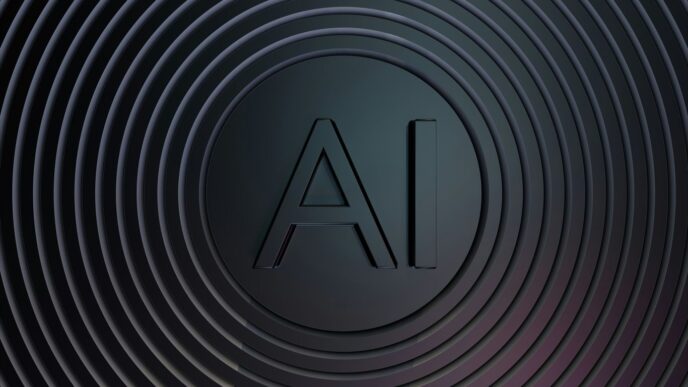This past week, the world of AI kept moving fast, and we’ve got all the big stories for you. From how AI is changing jobs to new tech stuff and how it affects marketing, there was a lot going on. We also look at how people are talking about AI and some new apps that came out. So, if you want to know what happened with AI news last week, you’re in the right place.
Key Takeaways
- AI is starting to affect jobs, with some companies already seeing changes.
- There are some disagreements happening between big AI players like Microsoft and OpenAI.
- Even with AI, making things accessible online still needs a human touch.
- AI is a big deal for marketing, helping businesses with their campaigns and data.
- We need to think about how AI might change our brains and how we learn.
AI’s Impact on the Workforce
The First AI Job Cuts Are Already Here
Okay, so the robots aren’t just coming; they’re here, and they’re apparently taking jobs. Amazon’s CEO, Andy Jassy, dropped a bomb last week, saying AI will "eliminate the need for certain jobs" in the coming years. And get this – he wasn’t talking about warehouse workers. It’s the white-collar folks who should be nervous. It’s a bit scary, honestly. I wonder if my job is safe? I should probably start learning how to train AI or something.
Amazon CEO Andy Jassy’s Outlook on AI and Jobs
Jassy’s statement has everyone on edge. He’s focusing on AI applications and how it can make companies more efficient. The big question is, what happens to the people whose jobs get automated? Will companies retrain them? Will there be new jobs created that we can’t even imagine yet? Or are we heading for a future where a large chunk of the population is unemployed? It’s a complex issue with no easy answers. I guess we’ll just have to wait and see how it all plays out.
Reconsidering Revenue Per Employee
Companies are now looking very closely at "revenue per employee." Basically, they’re trying to figure out if a computer can do a job faster and cheaper than a human. If the answer is yes, you can guess what happens next. This is a pretty cold way to look at things, but that’s business, I suppose. It’s all about the bottom line. Here’s what I think:
- Companies will invest more in AI to cut costs.
- Employees will need to adapt and learn new skills.
- The job market will become more competitive.
Key Developments in AI Technology
Growing Microsoft-OpenAI Tensions
Things are getting interesting in the AI world! It seems like the partnership between Microsoft and OpenAI might be facing some turbulence. While both companies are still working together, there are whispers about differing visions and priorities. It’s like when your friends start a band, and then one wants to go pop while the other wants to stay true to their garage rock roots. Nathan Myhrvold thinks human-level AI is closer than we think, needing just a few more breakthroughs. This could be a point of contention, with different ideas on how quickly and in what direction to push things.
SoftBank Pitches a Trillion-Dollar AI Complex
SoftBank is thinking big – like, really big. They’re reportedly planning a massive AI complex, and we’re talking a trillion-dollar investment. The scale of this project is mind-boggling. Imagine a whole city dedicated to AI research, development, and deployment. It’s like something out of a sci-fi movie. If they pull this off, it could reshape the entire AI landscape.
AI-Driven Image Narrator Update
AI is making strides in accessibility. The AI-Driven image narrator update is a great example. This tech helps visually impaired individuals "see" images by providing detailed descriptions. It’s not perfect, but it’s getting better all the time. Features like this are important because they show how AI can be used to make the world more inclusive. It’s cool to see AI being used for good, helping people experience things they might otherwise miss.
AI in Digital Accessibility

Automated Testing and AI’s Limitations in Accessibility
It’s wild to think how much we rely on automation these days. From smart homes to chatbots, AI is everywhere. But here’s the thing: it’s not a magic bullet, especially when it comes to digital accessibility. The idea that automated testing tools or AI overlays can guarantee an accessible website is just plain wrong. You can’t just set it and forget it. There’s still a need for human oversight and expertise to really make sure things are usable for everyone.
3Play Media’s Study on ASR Technology Plateau
3Play Media dropped their annual study, and it’s got some interesting stuff about ASR (Automatic Speech Recognition) tech. Apparently, we’re seeing a plateau in accuracy improvements for English pre-recorded content. Josh Miller, co-CEO at 3Play Media, mentioned that while ASR has come a long way, the gains are slowing down. This means we can’t rely solely on ASR for perfect transcriptions or captions; human review is still super important to catch those errors and make sure content is truly accessible. It’s a reminder that tech isn’t perfect, and ASR technology needs a little help.
U-M Digital Accessibility Strategic Initiative
The University of Michigan is stepping up its game with the Digital Accessibility Strategic Initiative. They’re relaunching the ITS web Accessibility Scanning Service to help departments evaluate and improve their website accessibility. This service is all about helping units proactively find and fix accessibility issues, making sure everyone has an inclusive digital experience. It’s cool to see institutions taking accessibility seriously and providing resources to make it happen. The goal is to empower all units to address barriers and improve accessibility for all users.
AI’s Influence on Marketing and Business
The Power of AI in Marketing
AI is changing how marketing works, no doubt about it. It’s not just a fancy tool anymore; it’s becoming a core part of how businesses connect with people. AI helps companies understand their audiences better, use data more effectively, and respond to what each customer wants. It’s like having a super-smart assistant that knows exactly what to do to get the best results. This shift is making marketing more personal and, hopefully, more effective.
Streamlining Campaigns and Data Insights with AI
Running marketing campaigns can be a real headache, especially when you’re dealing with tons of data. AI is stepping in to make things easier. It can automate a lot of the repetitive tasks, like sending emails or posting on social media. More importantly, AI can dig through all that data and find useful insights that humans might miss. This means you can see what’s working and what’s not, and adjust your campaigns on the fly. It’s all about making smarter decisions based on real information. For example, AI-powered marketing automation is revolutionizing campaign management.
Generative AI for Enhanced Efficiency
Generative AI is the new kid on the block, and it’s already making waves in marketing. Think about it: AI that can create content, write ads, and even design images. This can save marketers a ton of time and effort. Instead of spending hours brainstorming ideas, you can use AI to generate a bunch of options and then pick the best one. It’s not about replacing human creativity, but about giving marketers a powerful tool to streamline workflows and get more done in less time. It’s still early days, but the potential is huge.
The Broader Discourse on AI
The Broken Rhetoric of AI
It’s getting harder to cut through the hype surrounding AI. A lot of the discussion feels, well, broken. People are making grand claims that don’t always hold up under scrutiny. It’s important to be critical and not just accept everything you hear at face value. We need to ask tough questions about what AI can actually do, and what its limitations are.
A Detox Guide for Designers Navigating AI Discourse
Designers, in particular, are facing a barrage of information about AI. It can be overwhelming! It’s easy to get caught up in the excitement or the fear, but it’s important to stay grounded. A good approach is to take a step back and evaluate AI tools with a critical eye. What problems are they really solving? Are they truly making things better, or just adding complexity? It’s about finding a healthy balance and not letting the hype dictate your design process.
Feedback Is Not an Attack in AI Development
One of the biggest challenges in AI development is getting good feedback. People are often hesitant to offer criticism, especially when it comes to new technologies. But honest, thoughtful feedback is essential for improving AI systems. It’s important to create a culture where constructive criticism is welcomed and seen as a valuable contribution, not a personal attack. This means being specific, grounding feedback in evidence, and fostering a mutual understanding between developers and users. Here are some key points to remember:
- Be specific about the issue.
- Explain the impact of the issue.
- Suggest potential solutions.
- Listen to the developer’s perspective.
AI and Cognitive Development

AI’s Potential to Stunt Cognitive Growth
There’s a growing worry that constant use of AI could actually slow down how our brains develop, especially in younger people. It’s like relying too much on a calculator and forgetting how to do math yourself. A recent article in The Wall Street Journal pointed out that college grads might be good at spitting back information but struggle with coming up with new ideas or thinking critically. This is a problem because the brain keeps developing well into your twenties, and it needs to be challenged to grow stronger. Harvard study shows that AI boosts productivity but diminishes motivation.
The Importance of Exercising the Brain
Just like muscles, our brains need regular workouts to stay in shape. This means actively engaging in problem-solving, critical thinking, and creative activities. It’s not enough to just passively consume information; we need to actively process it, analyze it, and form our own opinions. Here are some ways to keep your brain active:
- Read books and articles that challenge your thinking.
- Engage in debates and discussions with others.
- Learn a new skill or hobby.
- Solve puzzles and play brain games.
Novel Insights Versus Regurgitated Information
One of the biggest concerns is that AI might be turning us into parrots, simply repeating what it tells us without truly understanding it. It’s important to be able to distinguish between regurgitated information and genuine insight. We need to be able to think for ourselves, come up with our own ideas, and challenge the status quo. If we rely too much on AI, we risk losing our ability to think critically and creatively. We need to make sure we’re not just using AI as a crutch, but as a tool to help us learn and grow. It’s about finding a balance between using AI to our advantage and making sure we’re still actively engaging our own brains.
New AI-Powered Applications and Tools
Alek: A Text-Based AAC App
I saw this cool thing the other day – it’s an app called Alek. Apparently, it’s a text-based AAC (Augmentative and Alternative Communication) app. The idea is to help people respond more naturally in conversations. I think it’s a great idea to help people communicate better.
Vivaldi Browser’s Accessibility Features
So, I’ve been messing around with the Vivaldi browser on my Android phone. It’s got some interesting accessibility features and a ton of customization options. It’s nice to see browsers thinking about digital accessibility more these days. I’m not sure if I’ll switch from Chrome, but it’s definitely worth checking out. Here’s a quick rundown:
- Customizable interface
- Built-in ad blocker
- Reader mode
Essential Zoom Tips for Better Meetings
Okay, who isn’t on Zoom these days? I found some tips that might make those endless meetings a little less painful. I’m going to try enabling HD video and playing around with the audio settings. Maybe I’ll even try a custom background, just to mess with people. Here are some tips:
- Use keyboard shortcuts
- Enable HD video
- Customize backgrounds
- Optimize audio settings
Wrapping Things Up
So, that’s a quick look at what happened in the AI world this past week. It’s pretty clear that AI is still changing things super fast, from how we work to how we interact with technology every day. We saw some big companies making moves, and there’s still a lot of talk about how AI will affect jobs. It’s a lot to keep up with, but staying informed is a good idea. We’ll be back next week with more updates, so you don’t miss anything important.
Frequently Asked Questions
How is AI affecting jobs right now?
AI is changing jobs by making some tasks automatic. This means certain jobs might not be needed anymore, even office jobs. Companies are looking at how much money each worker brings in and seeing if computers can do things cheaper and faster.
What are some big new things happening with AI technology?
There’s some disagreement between Microsoft and OpenAI about how they should work together in the future. Also, SoftBank wants to build a huge AI center that could cost a lot of money.
How does AI help people with disabilities, and what are its limits?
While AI helps with making things accessible, like testing websites, it’s not perfect. Studies show that AI for understanding speech hasn’t gotten much better lately. Also, a university is trying to use AI to find and fix accessibility problems on their websites.
How is AI making marketing and business better?
AI is super helpful in marketing. It can make advertising campaigns run smoother, help businesses understand their customer data better, and even create new content. This makes things more efficient and helps companies make smarter choices.
What’s the big talk around AI right now?
People are talking about AI in ways that might not be helpful. It’s important to think clearly about AI and give good feedback when building new AI tools, instead of just complaining.
Could AI stop our brains from growing?
Some worry that if young people rely too much on AI, their brains might not grow as strong. Just like muscles, brains need to be used and challenged to get smarter. If AI does all the hard thinking, people might not learn to come up with new ideas on their own.












